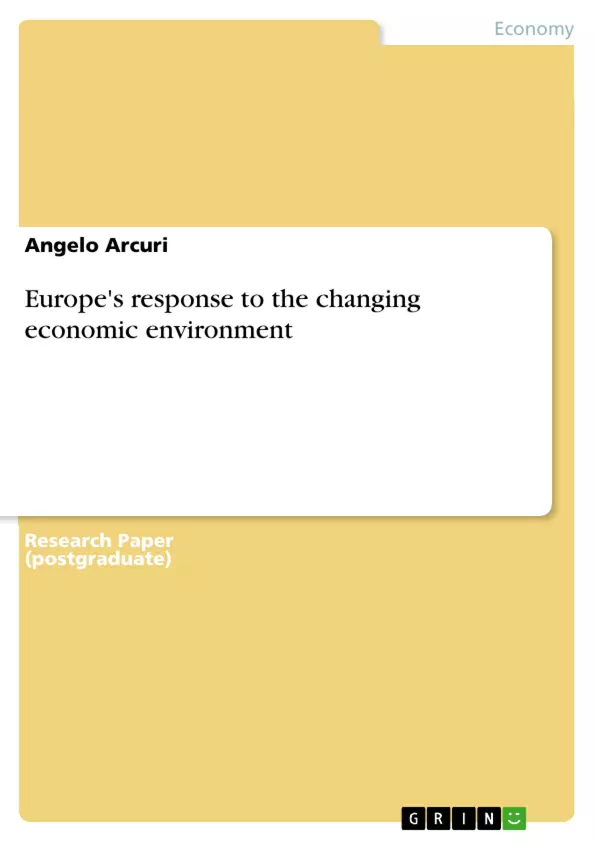This research paper attempts to explain how and to what extent the European economy has changed in response to major events occurred over the last two decades. The analysis draws upon Darwin’s theory of evolution to clarify why the adaptation process to the new economic environment has not been uniform across the Old Continent and notably why some countries have performed better than others. From an evolutionary perspective, special attention is given to the Italian and German economies, as the competitive gap between them has greatly widened in recent years, raising serious concerns about the political and economic stability of the European Union. Investigating the reasons underlying these asymmetric results provides useful information about the characteristics that the new international economic environment has discarded through a process of natural selection and those which have proved to be successful by giving a competitive advantage in the “struggle for existence”.
Inhaltsverzeichnis (Table of Contents)
- Introduction
- Major transformations in the international economic environment
- Italian and German economies: two distinct approaches to change
- Conclusions
Zielsetzung und Themenschwerpunkte (Objectives and Key Themes)
This research paper examines the adaptation of the European economy to major changes over the past two decades, utilizing Darwin's theory of evolution to explain the varied responses across different countries. The paper focuses on the divergent performances of Italy and Germany, highlighting the widening competitive gap between them and its implications for the European Union's stability.
- The impact of globalization on the European economy
- The role of the Euro and the 2008 financial crisis in reshaping the European economic landscape
- The contrasting economic responses of Italy and Germany to these changes
- The application of Darwin's theory of evolution to analyze economic adaptation
- The identification of key factors contributing to economic success in the new international environment
Zusammenfassung der Kapitel (Chapter Summaries)
- Introduction: This chapter introduces the concept of applying Darwin's theory of evolution to economic analysis, drawing parallels between the fields of biology and economics. It highlights the impact of Malthus's work on Darwin and explores the influence of evolutionary thinking in economics, particularly in the context of Thorstein Veblen's theories. The chapter then sets the stage for the analysis of the European economy's evolution, focusing on the contrasting experiences of Italy and Germany.
- Major transformations in the international economic environment: This chapter examines the significant shifts that have reshaped the global economic landscape over the past two decades. It identifies the key drivers of this transformation, including globalization of markets, introduction of the Euro, and the 2008 financial crisis. The chapter analyzes the impact of these events on the European economy, emphasizing the need to understand their interplay in shaping a new environment.
- Italian and German economies: two distinct approaches to change: This chapter delves into the contrasting responses of Italy and Germany to the major transformations discussed in the previous chapter. It analyzes the factors contributing to their divergent performances, highlighting the strengths and weaknesses that have emerged in each country's economic approach. The chapter aims to provide insights into the strategies adopted by these nations to adapt to the new international environment.
Schlüsselwörter (Keywords)
This research paper focuses on the evolution of the European economy in response to globalization, the Euro, and the 2008 financial crisis, utilizing Darwin's theory of evolution as an analytical framework. Key themes include the contrasting performances of Italy and Germany, the identification of factors contributing to economic success in the new global environment, and the implications of these trends for the stability of the European Union.
Frequently Asked Questions
How does Darwin's theory apply to economics?
The paper uses evolutionary theory as a framework to explain how national economies adapt to changes, suggesting a process of "natural selection" where successful strategies provide a competitive advantage.
Why did Germany perform better than Italy in recent years?
The research analyzes the asymmetric results of their adaptation processes, highlighting Germany's more successful response to globalization and the 2008 financial crisis compared to Italy.
What was the impact of the 2008 financial crisis on Europe?
The crisis acted as a major environmental shift that reshaped the economic landscape, forcing European nations to undergo rapid and often painful adaptation processes.
Is the Euro a factor in economic stability?
The introduction of the Euro created a new environment that rewarded certain economic characteristics while penalizing others, contributing to the widening gap between member states.
Who is Thorstein Veblen in economic theory?
Veblen was a pioneer in applying evolutionary thinking to economics, a concept the paper draws upon to analyze modern European economic transformations.
- Arbeit zitieren
- Angelo Arcuri (Autor:in), 2014, Europe's response to the changing economic environment, München, GRIN Verlag, https://www.grin.com/document/280690



